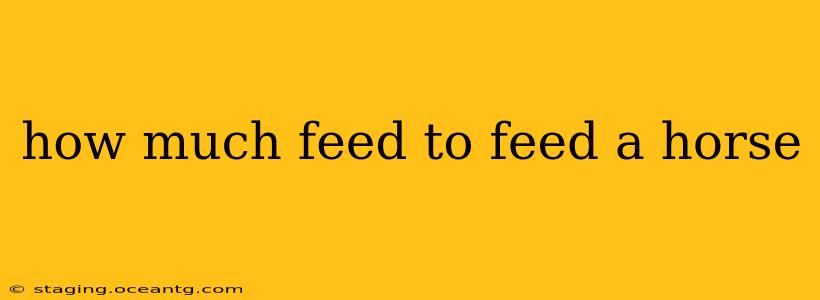Determining the correct amount of feed for your horse is crucial for maintaining their health, weight, and overall well-being. There's no one-size-fits-all answer; the ideal feeding plan depends on several factors. This guide will delve into these factors and offer strategies for calculating your horse's daily feed requirements.
What Factors Determine a Horse's Feed Needs?
Several key factors influence how much feed your horse needs. Understanding these factors is the first step towards proper feeding management.
-
Weight: A heavier horse will naturally require more feed than a lighter horse. Accurate weight measurement is essential, and regular weighings are recommended to monitor changes and adjust feed accordingly.
-
Work Level: Horses engaged in strenuous activities, such as intense riding or racing, burn more calories and require significantly more energy than horses in light work or pasture-only situations. A hard-working horse will need a higher-energy diet.
-
Age: Foals, yearlings, and growing horses have higher energy and nutritional demands than mature adult horses. Senior horses may require adjustments to their diet to support their digestive health and overall well-being.
-
Body Condition Score (BCS): This is a vital assessment. A BCS score (typically on a scale of 1-9) indicates the amount of fat cover on your horse's body. It helps determine if your horse is underweight, overweight, or at an ideal weight.
-
Type of Feed: Different feeds provide varying levels of energy and nutrients. Hay, grain, and supplements all contribute to your horse's overall daily intake and must be carefully considered. The nutrient content of the hay (e.g., quality and type of grass) significantly impacts how much needs to be supplemented.
-
Pasture Access: Horses grazing on pasture consume a significant amount of calories and nutrients. This must be factored into their overall daily intake to avoid overfeeding.
How to Calculate Your Horse's Daily Feed Requirements
There's no simple formula, but a good starting point is to consult with your veterinarian or an equine nutritionist. They can help you create a tailored feeding plan based on your horse's individual needs.
However, a general guideline is to provide approximately 1.5% to 2% of your horse's body weight in total feed per day. This is a very broad range, and significant adjustments might be needed depending on the factors mentioned above. For example:
- A 1000lb horse: Might consume between 15-20lbs of total feed (hay and grain combined).
Important Note: This is just a starting point. Regular monitoring of your horse's body condition score is crucial to ensure they are neither underfed nor overfed.
What if My Horse is Overweight or Underweight?
Overweight Horse: If your horse is overweight, reduce the amount of high-energy feed (grain) and increase the amount of low-energy roughage (hay). Increase exercise and carefully monitor their weight.
Underweight Horse: If your horse is underweight, you may need to increase the amount of high-quality feed and/or supplement their diet with a vitamin and mineral supplement as advised by your vet.
What About Supplements?
Supplements should only be used when there is a specific nutritional deficiency diagnosed by a veterinarian. Don't start supplementing without professional guidance, as improper use can be detrimental to your horse's health.
How Often Should I Feed My Horse?
Many experts recommend feeding horses multiple smaller meals throughout the day, mimicking their natural grazing patterns. This helps to prevent digestive upset and colic. Aim for at least two feedings per day, but three or four smaller meals may be beneficial for some horses.
What are the Common Feed Mistakes Horse Owners Make?
- Overfeeding: This is very common and leads to obesity, which is linked to several health problems in horses.
- Underfeeding: Results in weight loss, poor coat condition, and decreased performance.
- Ignoring the importance of hay: Hay is the cornerstone of a horse's diet, and many owners don't provide enough of it.
- Not considering the horse's individual needs: Every horse is different, and a generic feeding plan will not always be adequate.
By understanding these factors and working closely with your veterinarian or equine nutritionist, you can ensure your horse receives the right amount of feed for optimal health and well-being. Remember, consistent monitoring and adjustments are key to maintaining a healthy feeding regime.
